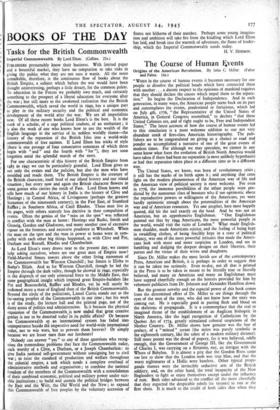BOOKS OF THE DAY
Tasks for the British Commonwealth
Imperial Commonwealth. By Lord Elton. (Collins. 21s.)
PUBLISHERS presumably know their business. With limited paper and a bountiful market, they have no temptation CO take risks in
giving the public what they are not sure it wants. All the more remarkable, therefore, is the continuous flow of books about the British Empire, a subject which before the war would have been thought uninteresting, perhaps a little dreary, for the common palate. To education in the Forces we probably owe much, and certainly something to the prospect of a liberal education for everyone after the war ; but still more to the awakened realisation that the British Commonwealth, which saved the world in 1940, has a unique part to play in the military security and the political and economic development of the world after the war. We are all imperialists now. Of all these recent books Lord Elton's is the best. It is the work of a scholar, of a sage political student, of an enthusiast ; it is also the work of one who knows how to use the wealth of the English language in the service of its noblest worldly theme—the history of the expansion of the British Isles into a world-wide commonwealth of free nations. If Lord Elton has tricks of style (there is one passage of four consecutive sentences of which three begin with " and " and the fourth with " for "), they are soon forgotten amid the splendid march of the story.
For one characteristic of this history of the British Empire from 1485 to 1945 we can be particularly grateful. Lord Elton gives us not only the events and the policies, but also the men who have moulded and made them. The British Empire is the creature of the British character, itself bred of our island history and our island situation ; but every now and again the British character flowers in some_genius who carries the torch of Fate. Lord Elton knows and tells how much of our history in India is the history of Clive and Hastings ; in Central Africa, of Livingstone (perhaps the greatest Scotsman of the nineteenth century); in the Fast East, of Stamford Raffles ; in Southern Africa, of Cecil Rhodes. These men live in his pages, with others scarcely less decisive in their compulsion of events. Often the genius of the " man on the spot" was reflected in conflict with the man at home: Hastings and Burke, Smith and Glenelg, Gordon and Gladstone, and many another case of excessive vigour on the frontiers and excessive prudence in Whitehall. When the man on the spot and the man in power at home were in sym- pathy with each other big things happened, as with Clive and Pitt, Durham and Russell, Rhodes and Chamberlain.
As Lord Elton's story draws near to the present day, we cannot help asking ourselves, where are our great men of Empire now? Field-Marshal Smuts towers above the other living statesmen of the Commonwealth bar Winston Churchill ; but Smuts is Elisha to Botha's Elijah. And as for Winston Churchill, though he led the Empire through the dark valley, though he showed in 194o, especially in the dispatch of our only armoured force to the Middle East, that same geographical insight which inspired great Empire-builders like Pitt and Beaconsfield, Raffles' and Rhodes, yet he will surely be reckoned more a man of England than of the British Commonwealth. Beyond the circle of the politicians, Lionel Curtis stands out as the far-seeing prophet of the Commonwealth in our time ; but his work is of the study, the lecture hall and the printed page, not of the dusty arena of politics and administration. Is it because the physical expansion of the Commonwealth is now ended that great creative genius is not to be descried today in its public affairs? Or because the Commonwealth as an international system has faded into unimportance beside the imperative need for world-wide international order, not to win wars, but to prevent them forever? Or simply because we are lesser men than our forebears?
Nobody can answer " yes" to any of these questions who recog- nises the tremendous problems that face the Commonwealth today, each worthy of a Clive, a Durham, or a Joseph Chamberlain: to give India national self-government without consigning her to civil war ; to raise the standard of production and welfare throughout the colonial empire, a task which needs a complete overhaul of administrative methods and organisation ; to combine the national freedom of the members of the Commonwealth with a consolidation of their combined economic, political and military power under suit-
able institutions; build and sustain the political bridges between the East and th West, the Old World and the New ; to expand this Commonwealth of free peoples by the voluntary accession of States not hitherto of their number. Perhaps some young imagina- tion and ambition will take fire from the kindling which Lord Elton has laid, and break into the warmth of adventure, the flame of leader- ship, which the Imperial Commonwealth needs today.
H. V. HoosoN.






















 Previous page
Previous page